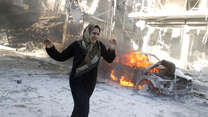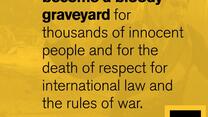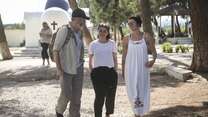Never before has the world witnessed such a dramatic scale of human suffering. Today, 65 million people—24 per minute—are displaced worldwide by conflict and persecution. In a year of unprecedented crisis, these are the ten most-read stories on Rescue.org about refugees and humanitarian aid.
10. Meet the 1%: an inside look at refugee resettlement
Today’s refugee will live in a camp for 17 years on average, in limbo until he or she can safely return home or find refuge in another country. Resettlement is a lifesaving and lasting solution for those with nowhere else to turn. It also benefits the countries that welcome them – and yet it is a chance afforded to a mere one percent of refugees worldwide. Read more.
9. An unrelenting drought has gripped millions of lives in Ethiopia
Ethiopia has suffered recurrent drought for decades, but this year's drought may have been the worst in half a century, affecting more than 10 million people. The International Rescue Committee (IRC) responded by delivering clean water and helping to establish adequate sanitation and access to health care. Now forecasts suggest a new drought is looming. Read more.

8. “Before I die, I need to put my family back together”
Mawa was torn away from his family by Sudan’s civil war. Then, just three months after resettling in the U.S., he was diagnosed with kidney failure. A kidney transplant was unsuccessful. Realizing time had become precious, Mawa made a wish: to be reunited with all of his children. After a decade apart, they were reunited with the help of the IRC in Baltimore. Read more.
7. Aleppo bombs: "It’s pretty much nonstop; it’s terrifying"
Before Syrian government forces seized control of rebel-held eastern Aleppo in mid-December, months of intense bombings forced cilivians to shelter underground in terror. The attacks damaged or destroyed the last remaining hospitals in these neighborhoods, including three supported by the IRC. One Aleppo resident described what it was like to live under siege. Read more.

6. Crisis in Iraq: what life is like under ISIS
Since October, Iraqi forces have been fighting to liberate Mosul—Iraq’s second largest city—from more than two years of ISIS control. The battle has displaced hundreds of thousands of people who are in desperate need of food, water, shelter and medical care. Three families who fled ISIS described the brutality and oppression they suffered under the extremist group’s rule. Read more.

5. #RealmToTheRescue: Join Game of Thrones and the IRC to help refugees
The IRC and HBO's "Game of Thrones" are working together to bring attention to the global refugee crisis and raise emergency funds. During a visit to see IRC programs in Greece this year, "Game of Thrones" actors Lena Headey, Liam Cunningham and Maisie Williams called on European Union leaders to do much more for the 57,000 refugees currently stranded in the country. Read more.
4. A Syrian teenager describes her escape from war-torn Aleppo
This year thousands of children in Aleppo were trapped without food, water or medical care as the city collapsed from many months of intense aerial bombing. The carnage took the lives of 16-year-old Hiba’s parents and sister, but against all odds she was able to escape to Jordan with her three younger brothers. She shared her recollections and drawings of her life in Syria. Read more.

3. How to help Syrian refugees
All of us at the IRC are grateful for the compassionate response this year to the plight of Syrian families and other refugees uprooted by crisis. In an article first posted in 2015 and periodically updated, we share a number of different ways people can join with the IRC to help refugees, from donating, to volunteering, to speaking out in support of refugees and resettlement. Read more.

2. Seven common myths about refugee resettlement in the United States
There has been a vocal minority of elected officials in the U.S. that have promoted misinformation and misconceptions about refugees and how resettlement really works. Contrary to conventional wisdom, refugees welcomed to the U.S. come from all over the world, represent a diversity of religions, and are invariably hard-working and successful. Read more.
1. Aleppo: Aid for Syria’s most war-torn city
In November, some 250,000 Syrians were pinned down by clashes between Syrian government forces in western Aleppo and rebels controlling eastern neighborhoods. By the end of December, following months of besiegement and aerial bombardment, the government had regained full control of the city—sparking a mass evacuation and reports of bloody retribution. Read more.

Escaping Aleppo doesn’t mean escaping the war. After witnessing the ferocity of attacks on civilians in the city, the IRC is very concerned that the sieges and barrel bombs will follow tens of thousands of Syrians who have sought shelter in Idlib. We look at what’s next for people who fled Aleppo.



